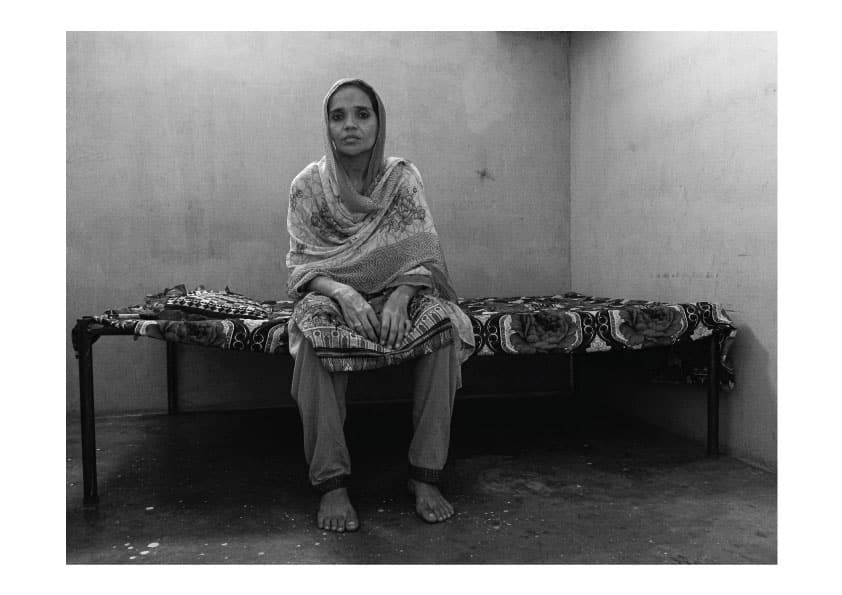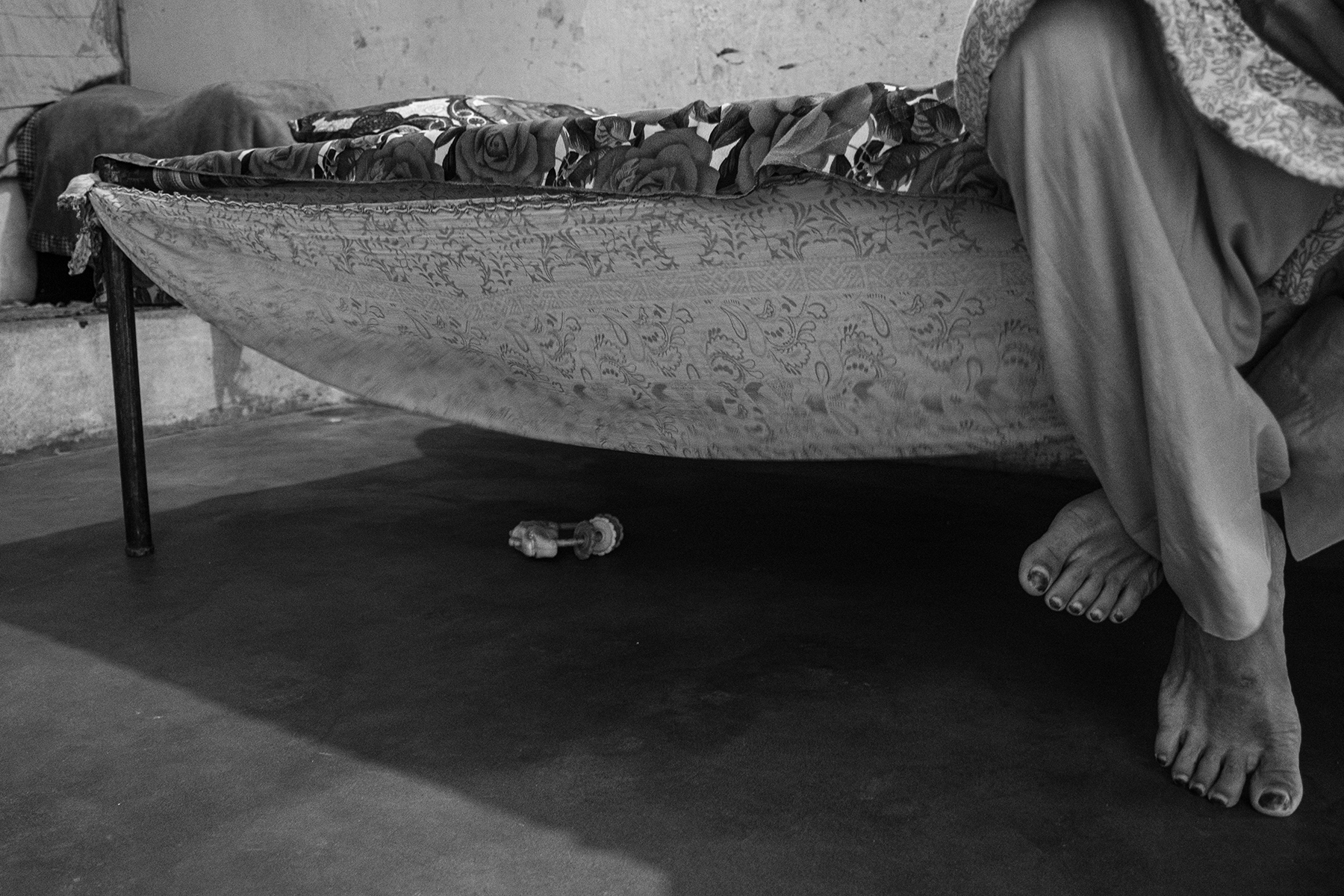Infrastructure of Love
By Sidra Altaf
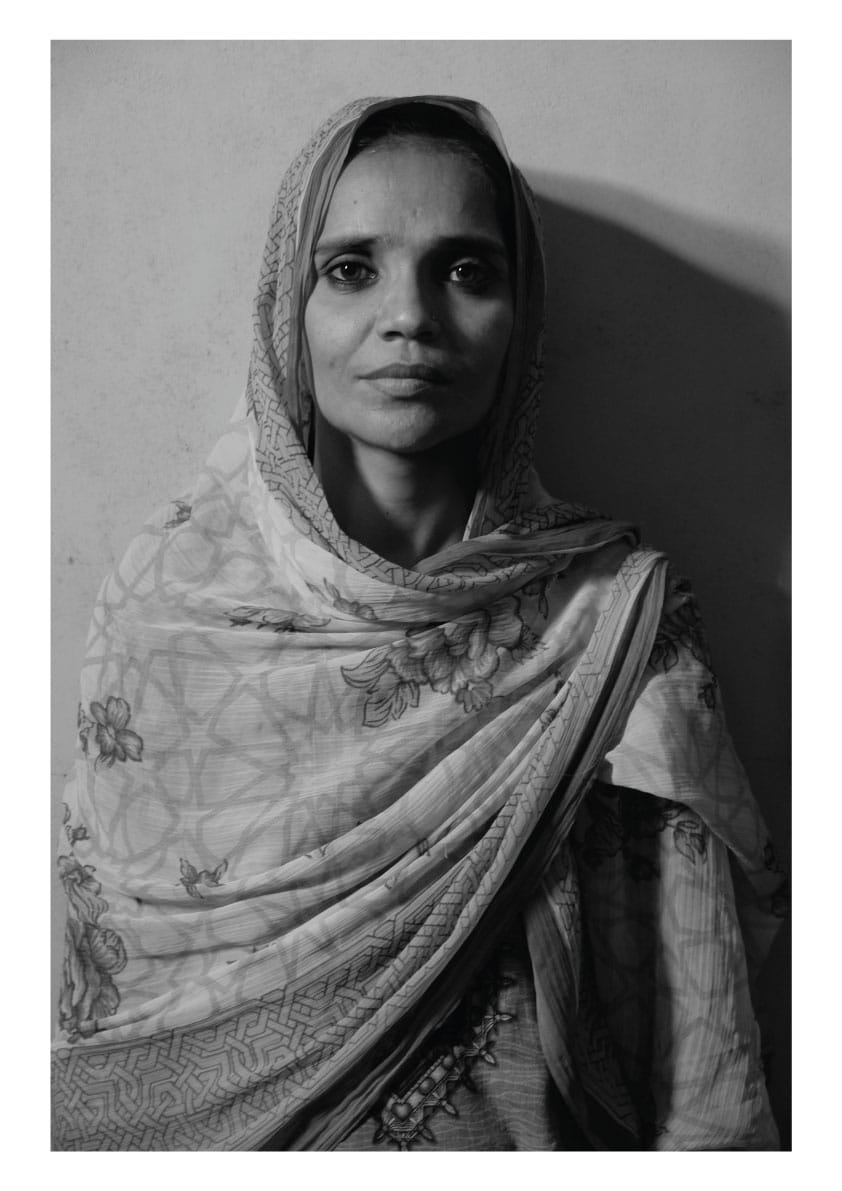
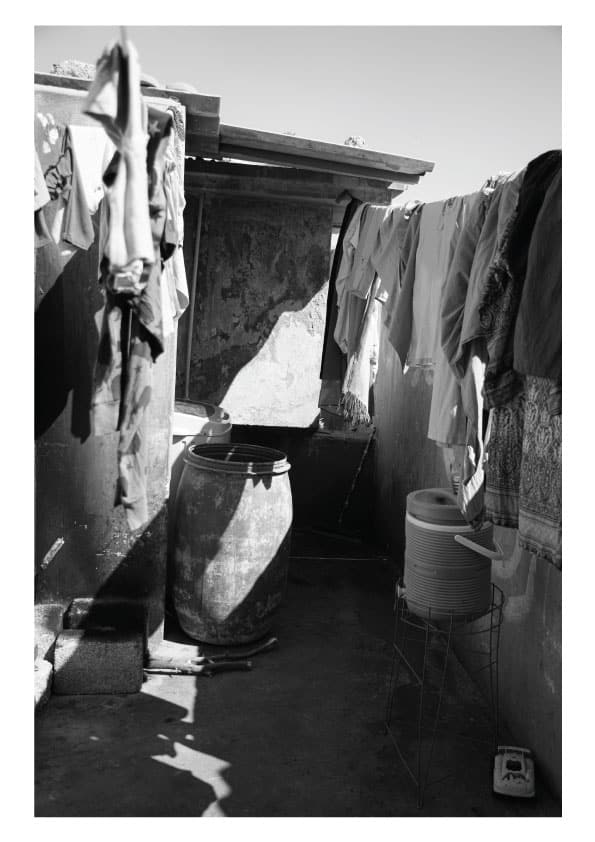

PAKISTAN PHOTO FESTIVAL FELLOWSHIP 2021 PROJECT
This “Infrastructure of Love” provides necessary support to these women in a life where they face several hurdles—domestic, social, and economic— at all fronts. In most gruelling conditions, these women have to work 12-14 hours a day in one of the hundreds of textile factories in Karachi to make a living.
Korangi Industrial Area is located in Korangi District, in Karachi, Sindh, Pakistan. It is one of the largest industrial areas of Pakistan. It houses approximately 4500 industries, and commercial and trading units including textile, steel, pharmaceutical, automobile, chemical, engineering, and flour mills. The population of Korangi town is 546,504, due to Industrial Zone, several laborers migrate from time to time.
An area infused with industries and its workers. It is one of the formidable areas in Karachi, with broken roads and harsh living conditions as the summers are getting more n hotter with climate change. The roadsides are covered in garbage and have no trees. If you see it from Birdseye, it is a barren land. Government never takes much notice of the working conditions or the welfare of those (including females) that are working in one of the country’s largest industrial sector, when in fact, they are part of the founding stones of the textile industry which contributes significantly to the country’s GDP and have a critical role to play in our society by providing employment opportunities to hundreds of thousands of people. The only infrastructure that the government provides for these factories to run and their employees is the building of pipelines, roads, bridges, sewers and tunnels. But the most important infrastructure based on which the factory workers, majority of whom are female, survive and get through with everyday life is the social infrastructure they construct – the connections and relationships they build based on love.
As I have worked with such communities before as well, and have seen their lives closely. I couldn’t help but think wondered about how the female workers go in everyday to work in this scorching heat. What were the circumstances that compelled them to work in these kinds of working conditions? How they manage their lives by working 12 to 14 hours a day? How they manage their families? Are they the sole bread earners for their families? And the most significant question I need to ask that how government doesn’t pay any heed to these female workers who is part of our society
With all these concerns and questions raising in my mind, I felt a need to highlight these autonomous communities through intimate infrastructure of care, generosity, trust and love. My work is a cultural study of the uniform levels of relation and human connections. Working with these family I reveal how people work, dream and find joy in the most different and challenging condition and how people feel differently about every situation in their life.
This “Infrastructure of Love” provides necessary support to these women in a life where they face several hurdles—domestic, social, and economic— at all fronts. In most gruelling conditions, these women have to work 12-14 hours a day in one of the hundreds of textile factories in Karachi to make a living. Much has been written and researched about the back-breaking and difficult working conditions women face within the factories. But few have asked how do these women—wives, bhabi, mothers, and family matriarchs—manage to raise children, build homes, care for family members, find safety and protection, deliver education and child-care, provide food, develop friendships and support each other.
I need to highlight these autonomous communities through intimate infrastructure of care, generosity, trust and love. My work is a cultural study of the uniform levels of relation and human connections. Working with these family I reveal how people work, dream and find joy in the most different and challenging condition and how people feel differently about every situation in their life.
My project is a novel take on understanding the lives of these women.
With this project “Infrastructure of Love”, I aim to examine the world of female textile workers living in the outer lying slums of Karachi, where people struggle to access the basic necessities of life. I will be documenting, in written and visuals, the human and social infrastructure of care, support and provision that helps millions of low-wage text workers, particularly women, to survive.

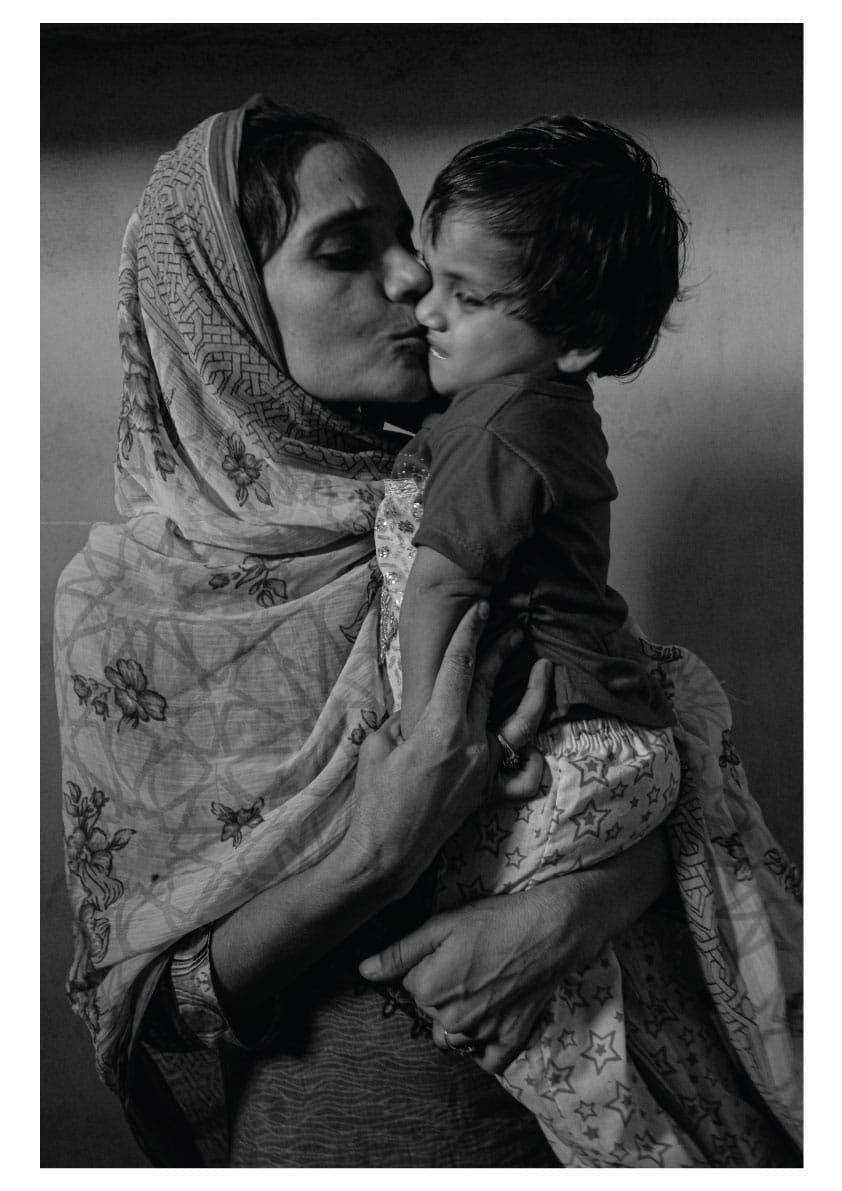
“Hassena is among thousands of workers living in Korangi Industrial Area, a tall thin structured lady, with deep features dominated by her expressive light brown eyes. she had moved from Nawabshah to Karachi with her family in search of employment. She is the only breadwinner of her family. She is a hardworking woman who is determined to do everything for her children and their education. She, herself, is not educated. Her mother used to work in the fields after her father had passed away. Haseena has now been working in the Stitching department of a Textile factory for over 5 years. According to her this is the only skill she knows.”
When I first met her, she was busy in her work, in factory, and when I was introduced to her, she gave me this powerful vibe of a woman who is against all her odds working with determination, and full of humility and grace. We chatted for a brief moment, she invited me to her house to come and share a cup of tea with her and family.
Her house was located on a narrow alleyway, without even proper roads or streets leading up to it. It was late afternoon, her house lit up with golden light. It is a three-story building with her land lady living on the ground floor and Hassena on the third floor, a narrow staircase leading toward the other floors of the building. The house opens to a veranda, a small kitchen in the corner, with only one living room.
She welcomed me with open arms and showed me great hospitality. I still remember her beautiful smile and the spark in her eyes. Not even once they make me feel that I was an outsider and I don’t belong in their small world. I connected with her instantaneously.
“Your tragedies have mold you into the person you have become, now be with yourself and strive for your destiny. Write your own fate.”
A Union of Love and Dream
She started to tell me her story in a humbled tone, with a glow in her eyes. Hassena got married to her husband at a very young age. Due to their low household income and better prospects in their home town, Hassena decided to move to Karachi with her family . Her husband used to work in a factory, but due to his diabetes he was unable to work for long hours.
Life was tough at first, when they moved to the big city. Her husband used to be the sole bread winner of the family. Despite of their limited means and resources, they were always very thoughtful about the future of their children and of their own too.
“I with my husband moved from Nawabshah to Karachi, leaving everything behind, because there it was very difficult to make both ends meet. After moving here my husband started a job, but he had to leave it because of diabetes. Then I started working in the same factory he used to work at.” – Hassena

A play of circumstances
Though everyone in their family were against girl’s education, Hassena and her husband never gave room to such thoughts in raising their kids. On the contrary, they believed in getting their kids fair chance on education, girl or a boy. When Hassena spoke of her elder daughter, Erum and her keen interest in learning, she was nothing less than a proud mother. But her limited resources have restricted her Erum from getting a good chance on schooling. Instead of continuing with her education, she is stuck at home, taking care of the household chores, while Hassena works 14 hours a day trying to make a living for her family.
As I walked quietly towards their small kitchen space, I stood and watched her while she preparing a soothing cup of tea for us. Erum’s mesmerizing smile gave away her enthusiasm as she told me that she has studied till 4th grade and really wants to continue with her education. But her family circumstances did not permit her to do so. She has to take care of her younger brother and cook for her family.
Erum told me that when everyone is at school, she goes to her neighbor’s place to study and learn new things.
“I really love studying. I used to go to school, but I had to give it up because of other household responsibilities. But our landlord daughter who is also a friend helps me to study at home” – Erum

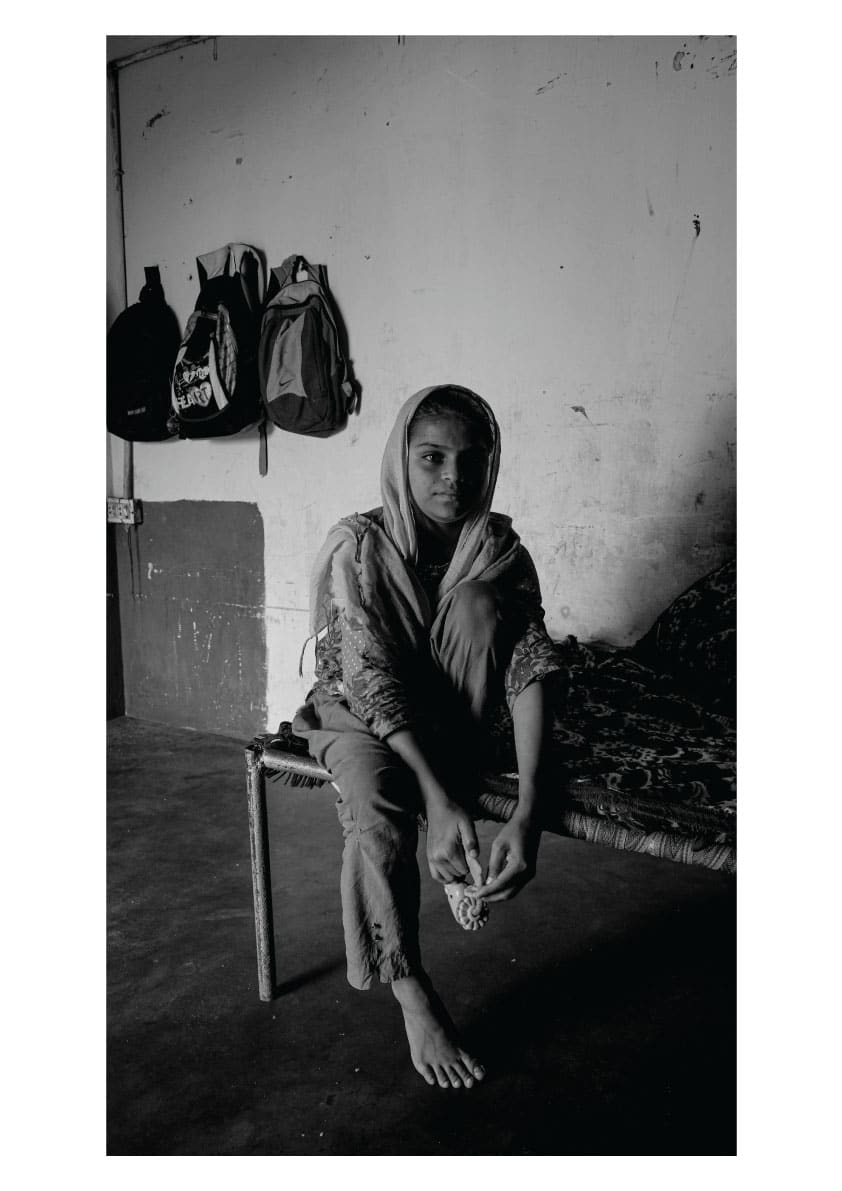
Erum loves to study, but her circumstances don’t allow her to do so. Hassena’s bhabi (Landlady) teaches Erum. Her passion and enthusiasm towards her studies, make me believe that one day, if everything turns around for the better, she might just be able to go back to school.
At 7 a.m. everyday Hassena drops her other elder daughter and a son Abdullah at school, while Erum looks after her toddler siblings and prepares lunch for them.
Not a day goes by, when both Erum and Hassena thinks and dream about a better future.
Memories in a trunk
With limited belongings, one of the most treasured one is that small silver trunk, stacked above a table, neatly covered with a cloth. That trunk holds a special value in their life. As it holds memories from some of the important days of their lives.
Even in their given situations or tough social circumstances, their memories are like photo book tucked in their brain, every time they open it and share a memory from it, it is just like that scene from the past come alive. Hassena opened her trunk of memories. Every item in that trunk was placed with such care. From there she picked a beautiful red frock, “This belongs to Amna, my youngest one. She wore it on her 1st birthday. We bought cake and invited neighbors and Amna wore this red color frock.” They don’t celebrate birthdays usually but Amna holds a special place in every one’s heart due to her difficult birth. When she was born both Hassena and the baby were in critical state and doctor had to operate. It was very worrying situation for the family as the chances of survival were low. But with prayers and support, Amna became a miracle baby among family and their support system.
When Haseena picked an old alphabet book from the trunk, Erum’s face lit up and she told us when she used to study. Hassena Showed us Erum’s school book and appraised her daughter on how good she is in studies.
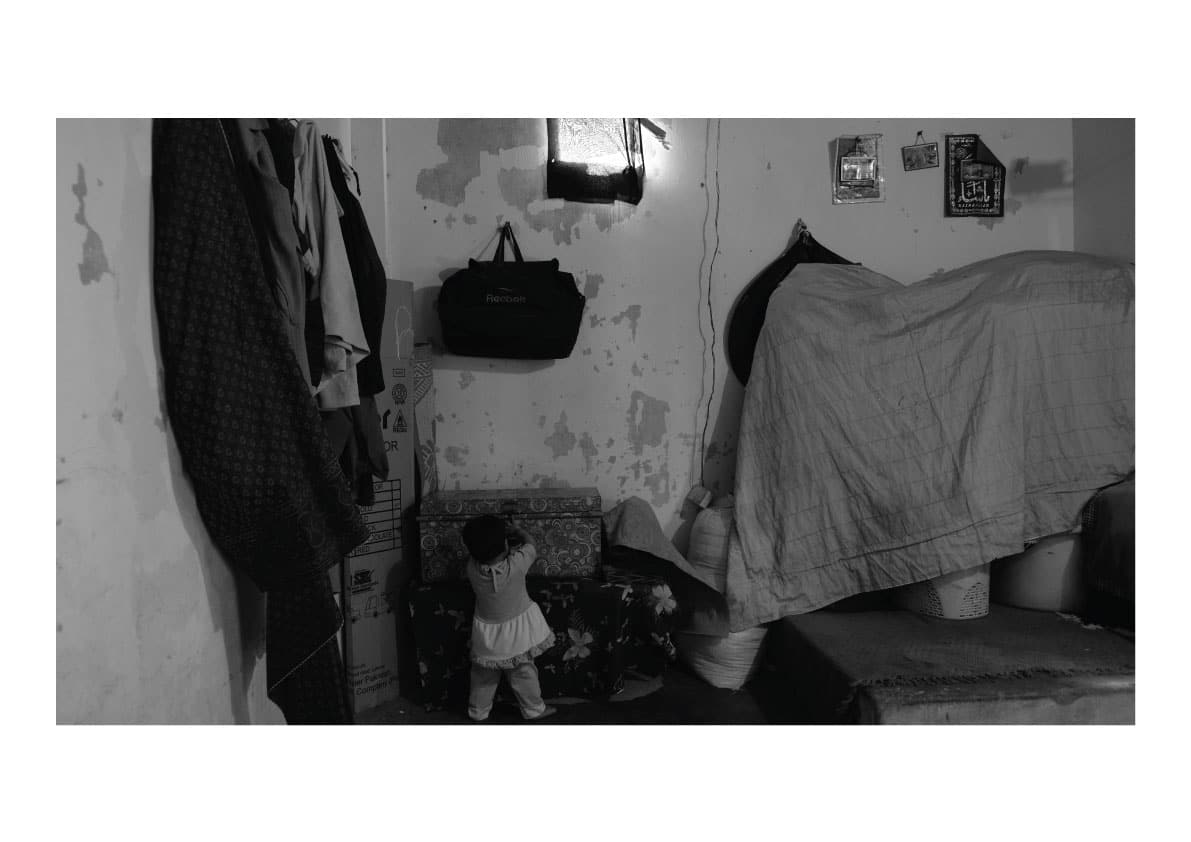
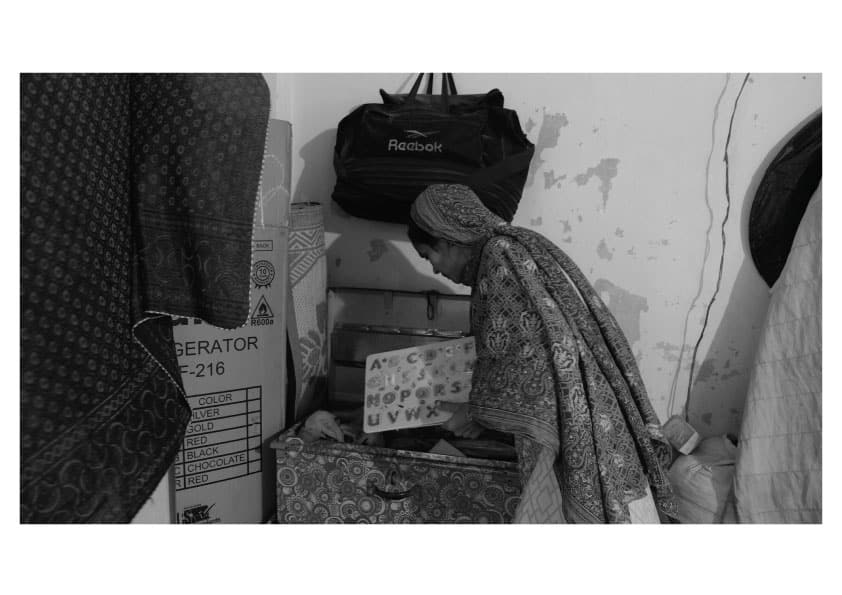

And then there was a bunch of old photos packed together in an envelope. With every photograph, a memory came to life.
Erum told us about the day when they visited the beach for the first time. They came all the way from Nawabshah. It was a cloudy day and idyllic for a picnic by the sea. They packed some stuff, and took some snacks. And had street food near sea view.
The small envelope of memories was like a lifeline, a window to past where all they remember are the happy days. These memories give them strength for the difficult days that they face today, and wraps a tomorrow in a hopeful embrace for more better and happy days to come.
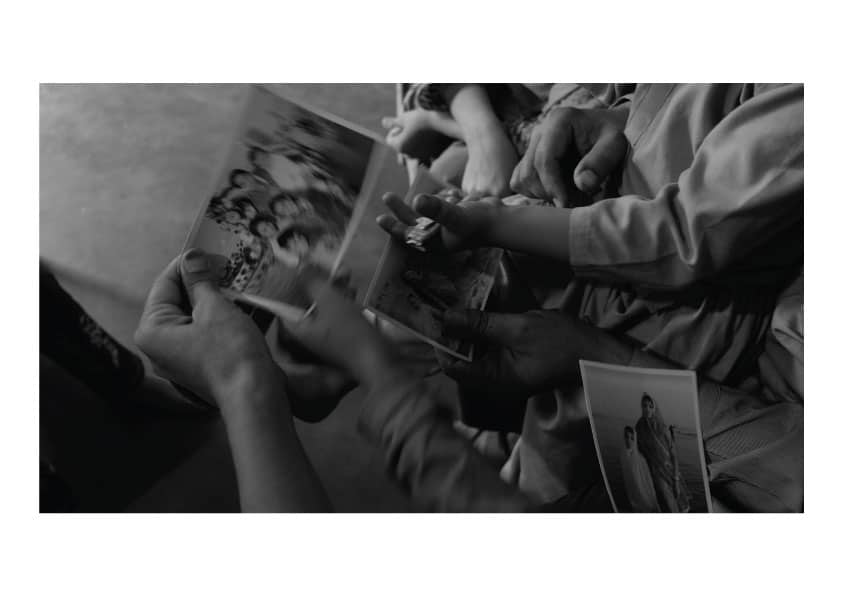
Happiness comes in waves
Hassena speaks about these beautiful pictures, which are memories now. When we came back from Nawabshah for the second time, we were staying at our relative’s house. They made a plan to go to Seaview in the afternoon. We also loved to go to the sea. The children had never visited Karachi. So, we got on the bus in late afternoon. We had to change 2 buses because there was no direct bus to Sea view from Korangi. Hassena shared her experience joyfully. “A day before the trip we came to Karachi, we only had chips and biscuits, we didn’t even have food, and we were all living in one-room”.
We woke up on the bright Sunday morning and had breakfast and morning tea. I prepared children to leave for the day trip. My husband bought some snacks and refreshments to have on the way to Clifton. Then we packed everything for the trip. Soon after we left the house and took the bus. We reached Seaview after 1.5 hours, as we had to change 2 buses.
During the conversation with Haseena, Erum came and sat next to me. Since she is the eldest of all the children, she still remembers the trip.
“Seaview is my favorite place but we rarely visit it now”. – Erum
The sea was beautiful as it sparkled in the warm sun. There were so many people there. Some were busy playing cricket, while others were riding horses and camels. While kids were playing with mud. There were so many people bathing in the water. By the time we had gotten out of the bus, I was already excited to go into the water and enjoy the sea. Ammi (mother) has already read our minds so she told us to eat something first then we all can go into the water. We had snacks first which were incredibly delicious then we drank cold drinks as well. We relaxed for a bit and then we all ran into the seawater. We were dancing with the waves and moving with the sea. It was a day we will always cherish.
After a while, Hassena bought lunch for me. She had cooked chicken Karhayei (Chicken Curry) and Paratha for me. She continued the conversation.
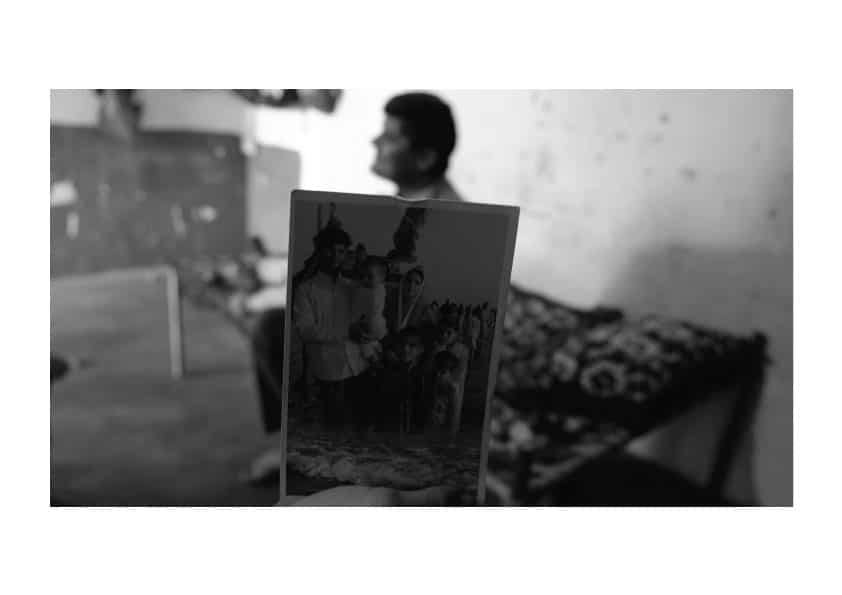

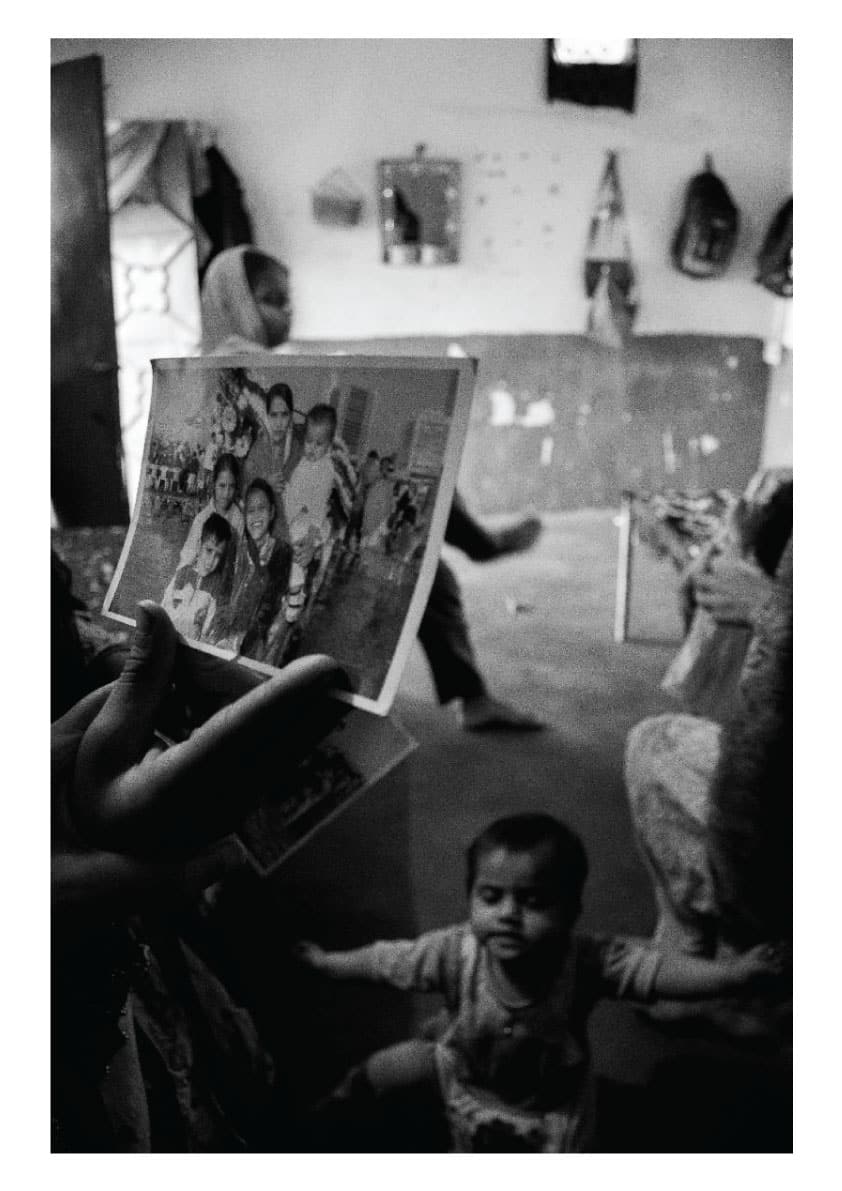

Erum’s dad doesn’t like the sea as the water is not clean so he refused to go with us. He was just watching us from afar. In no time it was 6 pm; we packed our belongings and decided to have dinner. There was a local hotel near the sea, from where we had delicious food. After an hour we caught the bus back home. I still remember seeing the sun setting on the horizon by the sea.
“I know someday we will return to enjoy again a day at Seaview with our children” – Hassena
After finishing this beautiful conversation with Hassena, Emaan, Hassena’s second daughter, served me warm Suji ka Halwa and Chai. When I was leaving her house, her children invited me again to spend time with them.
read and butter
Things changed for Hassena when she started working in a textile factory, 6 days a week, 12 hours a day.
For Hassena, managing work and family were two separate and challenging tasks. To help her with this, her elder daughter pitched in, compromising her studies, so she can take care of her younger sibling while Hassena is away at work.
But given the social and economic challenges of these labour class workers, it was not enough. Hassena would not have been able to put up with her work routine if it wasn’t for her whole support system; her family, neighbors, friends.
In life, we all need a support system to keep the balance of life. For Hassena, her support system was knitted/weaved between the people living in that building.
Her landlady, Farzana bhabi (Land Lady) not just supported Hassena during financial crisis but also looked after her kids when she was away working in the factory. As there was no relative of hassena living in Karachi. Hassena told me that whenever there is load-shedding in her area Bhabi cooks’ food for them, when children go to school in the morning bhabi makes sure to take care of Amna and Erum in her free time, bhabi’s daughter teaches Erum at home since Erum has quit school due to the responsibility of her youngest sibling.
From lunch time to evening snacks, to washing their clothes while Hassena was on bed rest after the birth of youngest Amna; bhabi made sure that Hassena’s children are well taken care of and that Hassena is well supported during her tough times.
Hassena’s husband, Anwar works at a utility store nearby where they live. That store is run by their very good friend and well-wisher, Mansoor bhai.
Anwar’s earnings are not enough and with rising inflation and tough social conditions, a household of 7 cannot survive on his earnings alone. Before his shop work, Anwar use to work in the same textile factory where Hassena works now. But when Anwar fell severely ill, Hassena took his place in the factory.
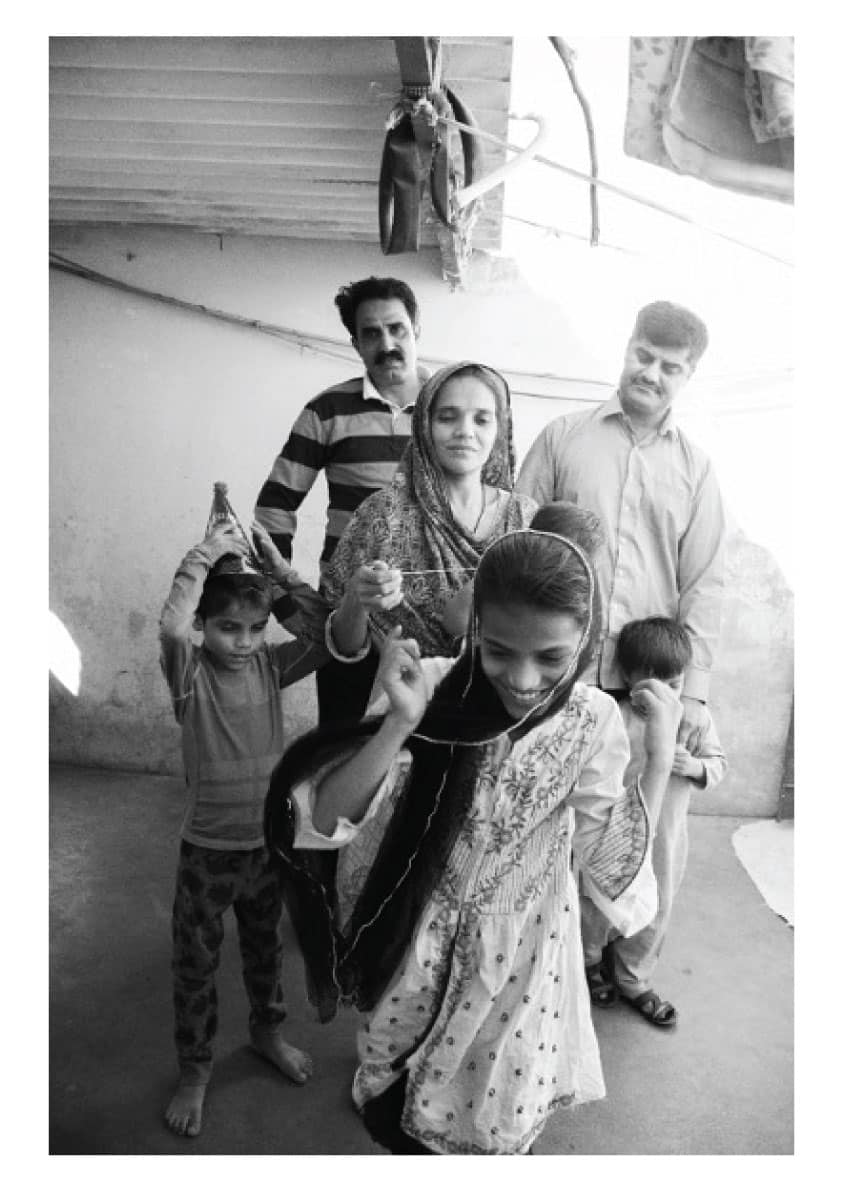
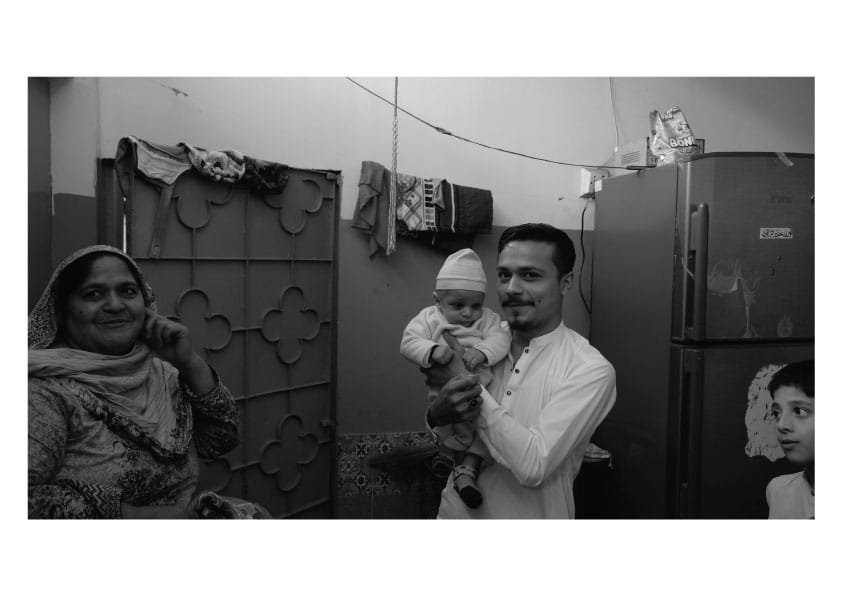
Unfortunately, our government isn’t paying heed to the lives of female factory workers. Hassena salary is PKR 22,000 and, in this amount, running a minimalistic household is very difficult. Without her neighbor’s support, it is tough for her to survive. A year back Hassena’s elder son Abdullah got into an accident and needed an urgent surgery. Hassena and her husband had insufficient funds to pay for this surgery.
The labour workers living in the slums of Karachi are not able to access their basic needs. Women working in the textile industries in Karachi constitute 30% of the workforce. Economic collaboration among women working in the textile industries of Karachi is crucial in ensuring women’s economic empowerment, which increases self-esteem and raises their respect among other people in society (Wolf, 2018). Therefore, economically empowered women will change the societal view of women, which will open doors for other women to engage in economic activities, which will help reduce the poverty levels of women working in the textile industries.
Hassena shared that incident with a very heavy heart “Mansoor bhai covered all medical expenses of Abdullah, he didn’t ask us anything in return. Abdullah was in so much pain he rarely eats anything but Mansoor bhai use to visit us daily to cheer him up and play with him. Now Mansoor bhai is like a family to us he comes home often to check up on us. Many times, he helps us to pay the tuition fees of my children. During Covid when my husband was at home, he still pays him a bit so we could arrange daily groceries. Usually, he comes on Sundays and have chai with us.”
While she was sharing her memories with me, her elder daughter entered in room carrying a tray of Samosa, potato chips and tea. Hassena politely nodded her head towards her daughter, praising her and continued her story.
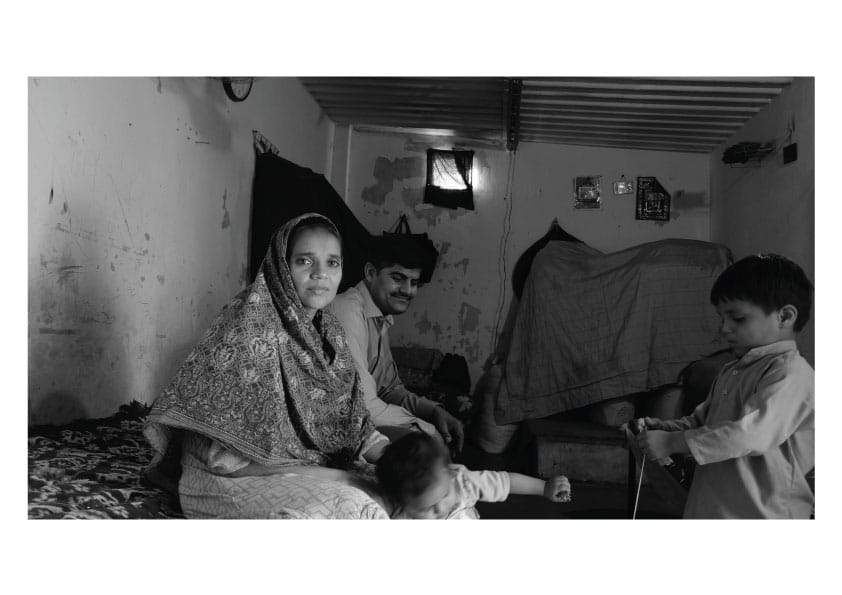
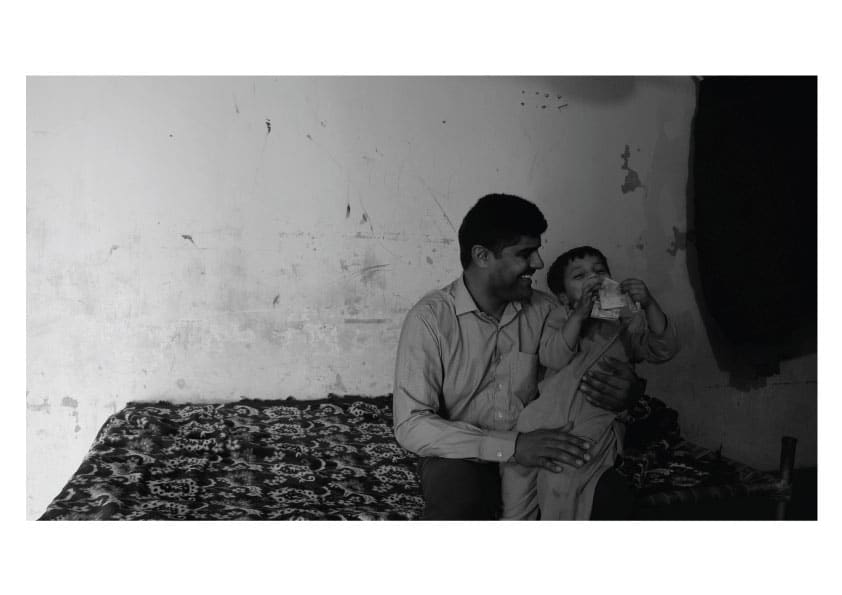
“In challenging times my HR manager Amina helped me a lot during my son’s surgery specially. There were overhead expenses for the hospital and medicines for Abdullah, she helped me to pay these overheads. She was also willing to give me an advance salary but I refused as I need my salary at the start of each month which is important to fulfill our daily necessities.
